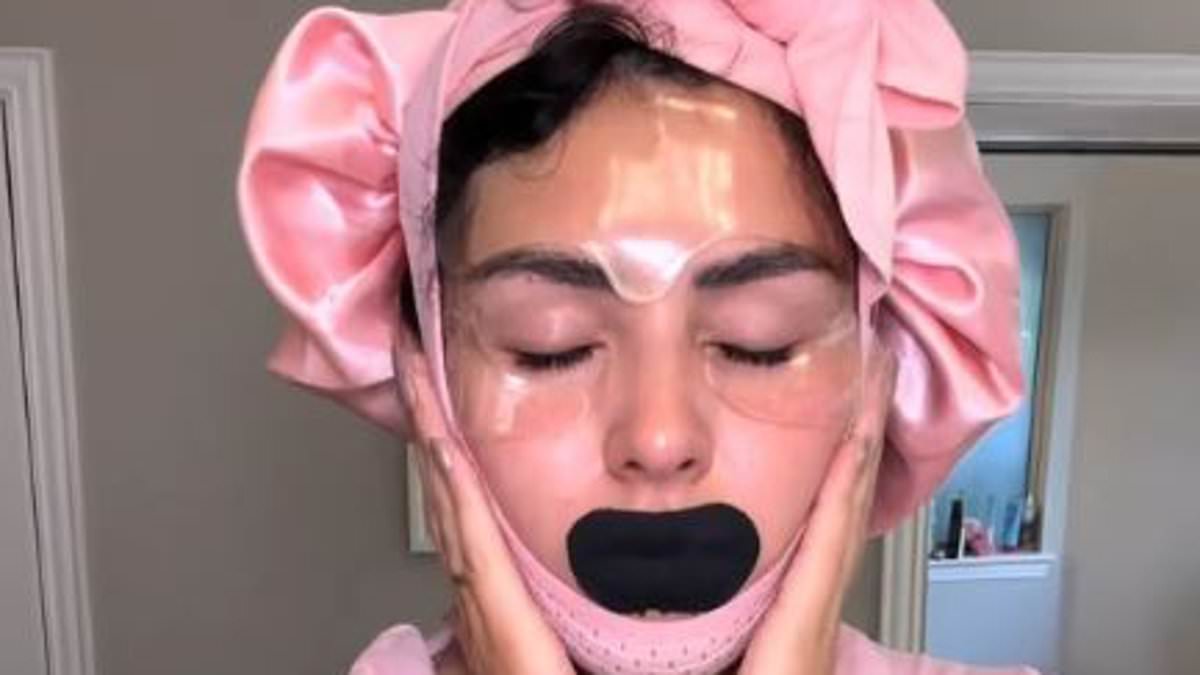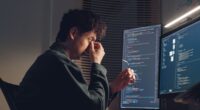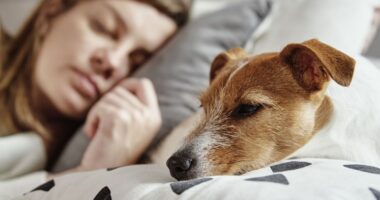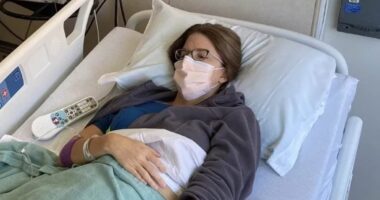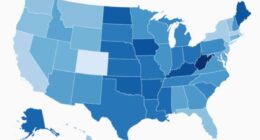The young woman in the video clip looks bizarre and, frankly, uncomfortable. There appears to be a large black plaster over her lips – holding her mouth shut. There’s a thick pink elasticated strap around her head that pulls tightly under her jaw and an array of jelly-like patches on her forehead and under her eyes.
It’s topped off with a ruffled pink silk bonnet. She removes each item one by one and leans into the camera to show, in extreme close-up, her dewy complexion.
The footage on the video-sharing app TikTok has been viewed 4.2 million times since being posted by Texas-based influencer Mayte Myers. She calls it her ‘morning shed’, as in ‘shedding’ all the things she wore to bed.
The implication is that this beauty regime is the way to have better skin. It’s part of a wider social media-driven trend for sleepmaxxing: so-called sleep influencers sharing the often extreme lengths they go to in pursuit of a good night’s sleep.

The woman has a large black plaster over her lips, there’s a thick pink strap around her head that pulls under her jaw and an array of jelly-like patches on her forehead and under her eyes

The footage on the video-sharing app TikTok has been viewed 4.2 million times since being posted by Texas-based influencer Mayte Myers
The mouth tape Mayte wears is designed to force breathing through her nose. Advocates claim this improves dental health, enhances oxygen uptake during sleep and aids more restful sleep. However, there is no medical evidence to support any of this.
The chin strap is supposed to reduce double chins and prevent facial sagging – not something you might expect the teens and twenty-somethings on TikTok to be worried about. Again, there is no proof that chin straps work.
The clear silicone stickers are reusable face masks that supposedly prevent wrinkles and moisturise the skin.
Other sleepmaxxing tips include: reducing screen time, avoiding carbs after lunch, taking supplements, eating two kiwis a day and drinking nothing too close to bedtime. The length and ‘quality’ of sleep is also obsessively monitored by sleepmaxxers using apps and wearable gadgets.
Could they be on to something?
Experts speaking to The Mail on Sunday say that going to such extreme lengths is ‘nonsense’ – and warn that buying into this fad could be harmful. ‘Being overly preoccupied with getting to sleep is self-defeating,’ said Dr John Groeger, Professor of Psychology at Nottingham Trent University and head of the university’s sleep research programme.
‘When you’re worried about getting to sleep – or getting the so-called right kind of sleep – your brain won’t be able to disengage enough to allow for restful sleep.
‘A lot of this sleepmaxxing advice is making the solution part of the problem.’ An American study from 2017 came up with a term – orthosomnia – to describe people seeking treatment for self-diagnosing sleep conditions due to their overuse of sleep trackers and wearable devices.
The researchers warned that the ‘perfectionist quest for the ideal sleep’ was becoming rapidly similar to orthorexia – a form of disordered eating where sufferers become obsessed with consuming only healthy foods.
And introducing props such as jaw straps and mouth tape to one’s night-time routine could have a similar effect, explained Dr Rebecca Crowley, a neuroscientist at Royal Holloway, University of London.
‘There’s one small study that shows mouth-taping at night might improve sleep in people with obstructive sleep apnoea, a sleep disorder that causes people to stop breathing for periods of time, but that’s it,’ she said.
‘There’s no evidence it benefits anyone else. The big problem with wearing all this stuff to sleep is discomfort. If you’re already suffering insomnia it could well make things worse.’
Dr Crowley says people who have trouble dropping off at night should look at their nutrition.
‘One of the most common pieces of advice we would give is for people to adjust their diets,’ she said.
‘In the evening, try to eat foods that are rich in melatonin – the hormone that regulates sleep-wake cycles – like bananas, almonds and oatmeal.’
Likewise, it’s best to avoid obsessing over how much time you’re spending asleep, say the experts.
‘People have this idea that everyone should get eight hours of sleep a night,’ said Professor Groeger. ‘But very few people – except young adolescents and children – get that much sleep.
‘It depends on your age, hormone levels, where you are in your menstrual cycle, what you do in the daytime – no one number is the same for all.
‘What the studies show is that sleep is very age-related – older people seem to need no more than six hours of sleep a night, for example. While people in their twenties will easily sleep for eight or more hours if they can.’

